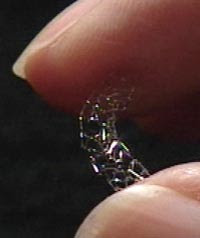Leon MB, Baim DS, Popma JJ, et al. New England Journal of Medicine. “A Clinical Trial Comparing Three Antithrombotic-Drug Regimens after Coronary-Artery Stenting”. 1998;339:1665-71
http://content.nejm.org/cgi/content/abstract/339/23/1665,
By the publication of this article in 1998, coronary-stenting that we discussed in previous blogs had become commonplace. Frequent use of coronary stenting had been accompanied by intense anticoagulant drug regimens, such as “intravenous low-molecular-weight dextran, oral aspirin and dipyridamole, and intravenous heparin followed by oral warfarin” (Leon MB). These drugs were effective, but resulted in prolonged hospital stays and occasional vascular problems. This study suggests the utilization of less aggressive antithrombotic drugs regimens. This article compares the effectiveness and safety of three different antithrombotic drugs. This trial is an attempt to address the main complication of coronary stenting, stent thrombosis, with mildly gentler drugs. The three antithrombotic drug treatments, aspirin, aspirin and warfarin, and aspirin and ticlopidine, were administered directly after stenting and then compared by examining incidence of stent thrombosis. Results showed that treatment with the aspirin and ticlopidine more effectively reduced stent thrombosis than aspirin alone, or aspirin and warfarin. But, it was also found that administration of aspirin and ticlopine slightly elevated risk of excessive bleeding and vascular surgical problems as compared to aspirin alone. This article is in disagreement with other studies claiming that the combination of aspirin and ticlopine had a lower incidence of vascular surgical problems than therapy with aspirin and warfarin. This study shows that the two separate drug regimens had similar incidences of vascular surgical complication. While this article suggests aspirin and ticlopidine as a milder, but still effective, drug regimen for reducing stent thrombosis, the regimen is not without its health risks. Aspirin and ticlopine provide the medical community and its patients with a good, but not a perfect alternative to aggressive anticoagulant/antithrombotic drugs. They do not address the problem of neointima hyperplasia or restenosis, which is largely unaffected by the antithrombotic regimen. Following this study, researchers would continue to search for different treatments that both prevent stent thrombosis and other risk factors, including neointima hyperplasia.


No comments:
Post a Comment